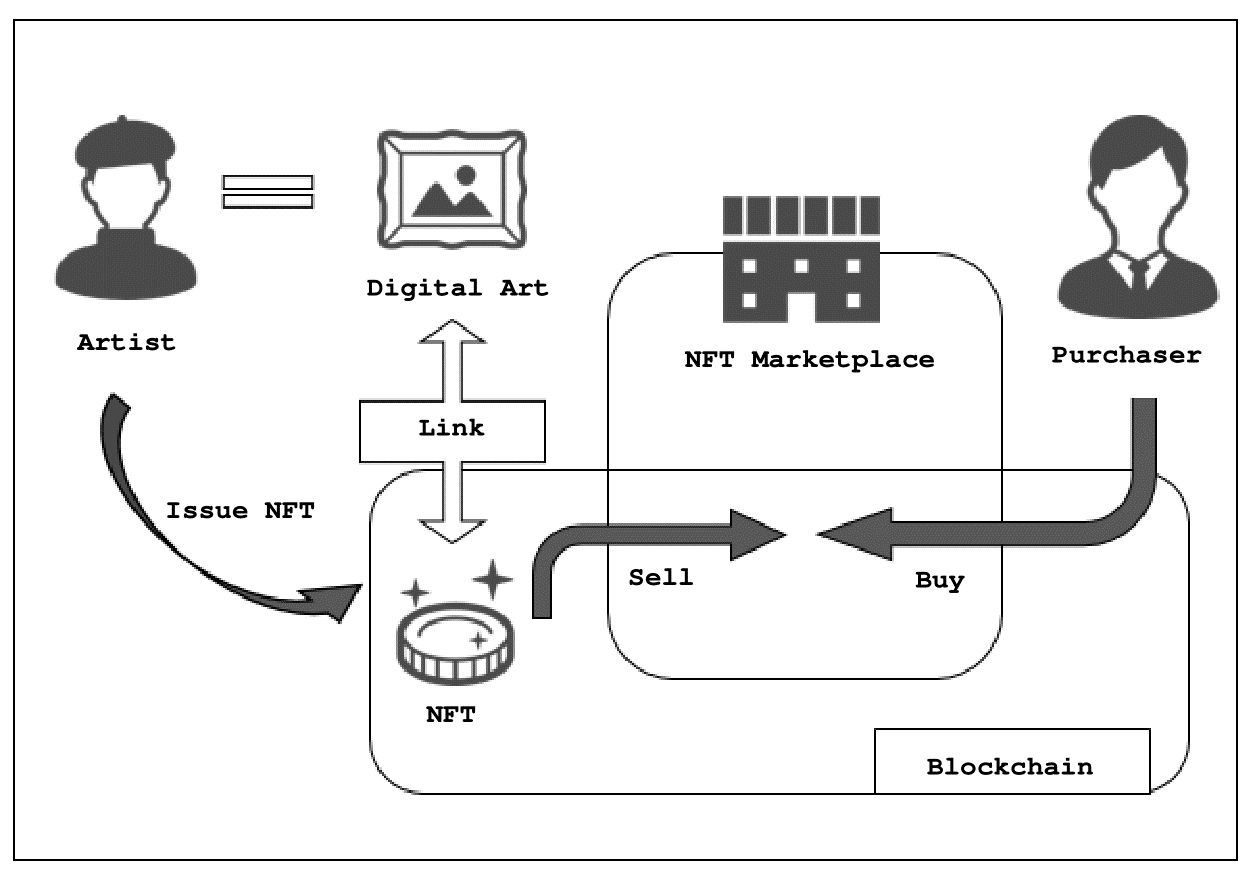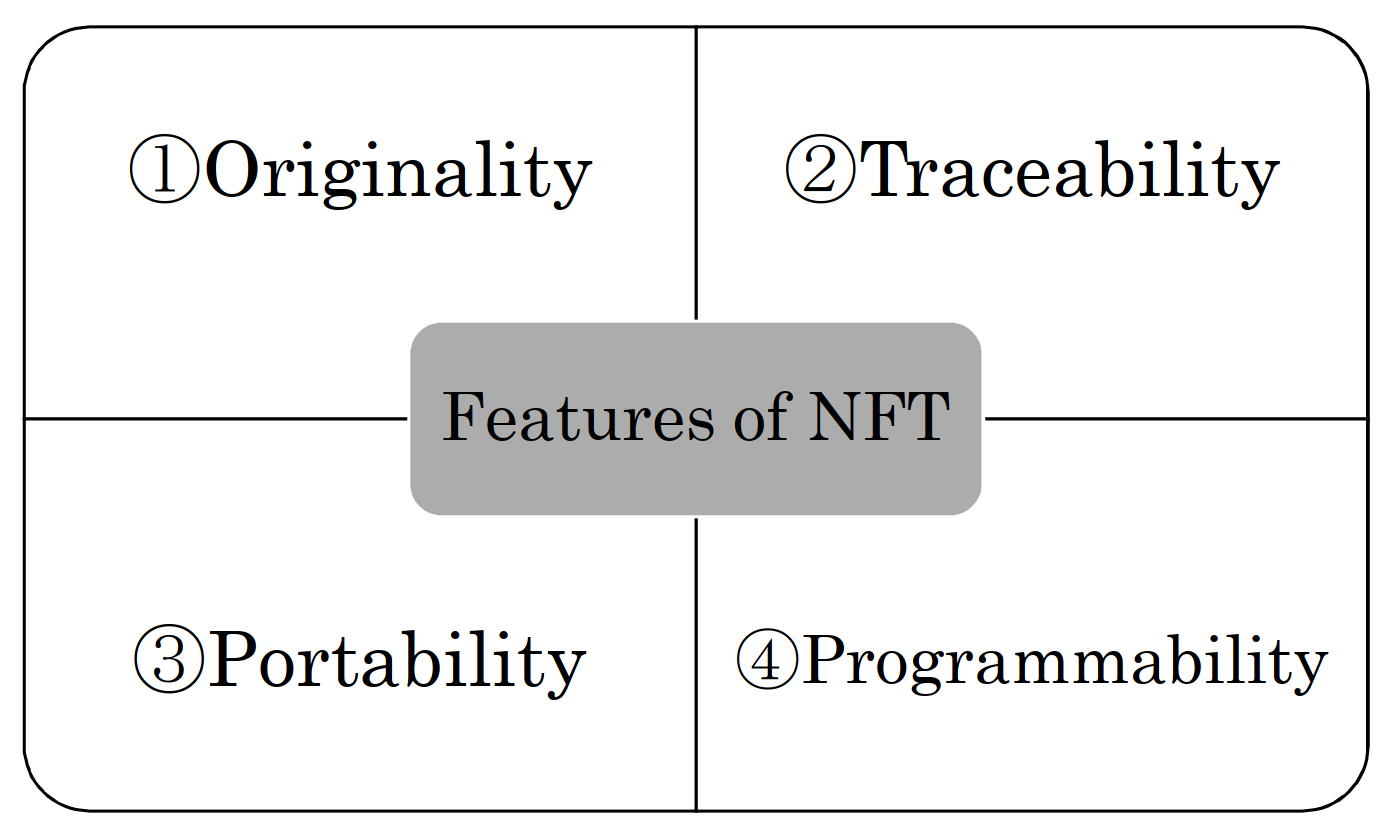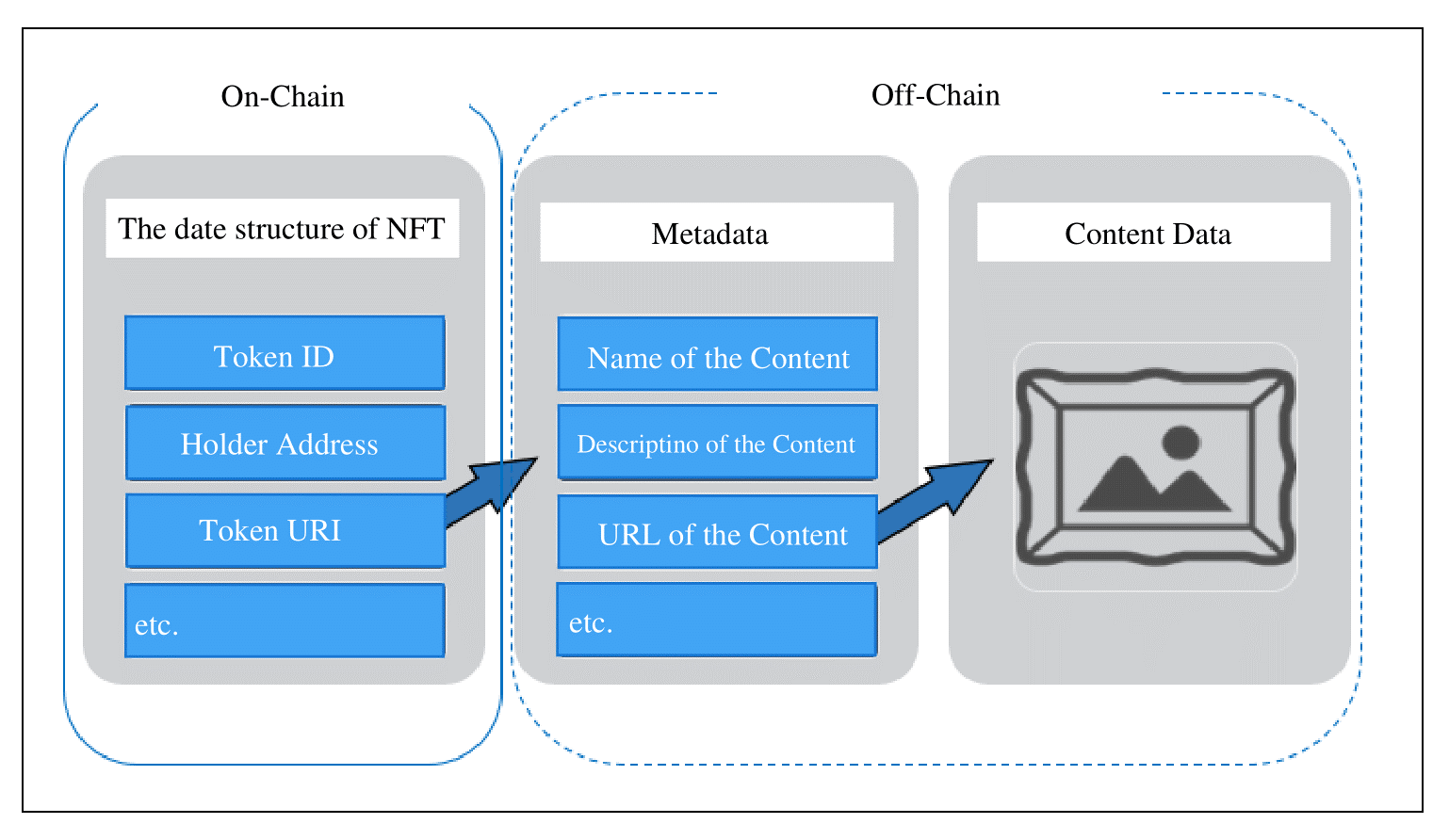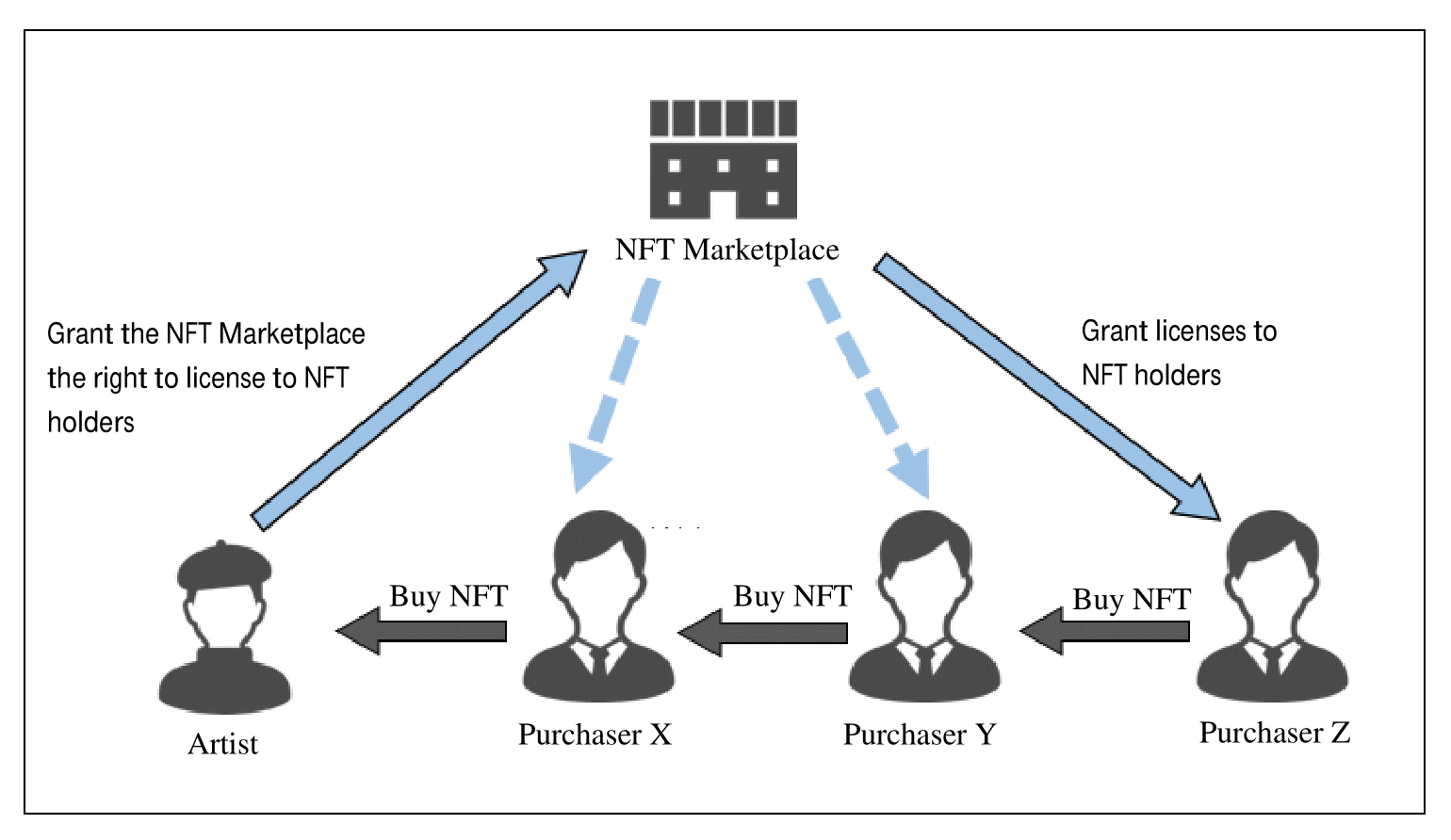NFT Mechanism and Legal Issues of NFT Transactions
I. Introduction
NFT is a non-fungible Token. I think that many people have recently heard the word. NFT was originally a hot topic in the cryptocurrency-related industry, but recently, coupled with the news that major companies are entering the NFT business, I feel the general awareness is growing. The news of the auction in 2021 is famous as one of the reasons why NFT attracted global attention. This is an NFT work of a digital artist called "Beeple" that was not very high profile at the time on the March of the same year ("Everyday ‒ The First 5000 Days") was valued at about 7.5 billion yen at auction.
In addition, the NFT Marketplace is a marketplace that helps artists convert digital art into NFT and provides a place for NFT transactions. It is also increasing rapidly. OpenSea, one of the major NFT marketplaces, is witnessing the expansion of the NFT-related market, with the total distribution in 2021-8 reaching about 3650 billion yen, which is more than 10 times the previous month's growth. If you are involved as a party in a transaction involving a business that originates from such a new technology, it is essential to understand the content of that technology and its legal impact on the transaction to protect your rights and prevent disputes in advance. In this paper, we outline the significance of NFT and the technology that is the source of its value, and examine the legal issues related to NFT, especially matters to be considered in formulating rules for NFT transactions related to digital art.
II. Features and mechanisms of NFT
1. Features of NFT
Before we outline the features and technical aspects of NFT, we will explain NFT transactions on the NFT marketplace using diagrams to give an image of what NFT is like.

First, digital art artists can apply specific blockchain standards (e.g. ERC-721 in Ethereum blockchain) and issue a token with a unique ID in compliance with this policy. In this way, tokens that have their own unique value and do not have an alternative to other tokens are called NFT. When publishing this NFT, artists can link the NFT to the digital art they have created. This is sometimes called the "NFTize" of digital art. It is now possible to prove that it is the original through the possession of NFT.
Artists can sell NFT linked to digital art in the NFT marketplace as described above. Users of the marketplace can find and purchase this NFT, and the transaction history at this time will be recorded on the blockchain. In this way, NFT is a landmark technology in that it gives scarcity and asset value to digital art, which was previously easily reproducible.
The above is an example of how to use NFT in relation to digital art, but NFT generally has the following characteristics.

Originality is unique in that NFT itself has a unique value and there are no other tokens. This unique value is recorded on the blockchain, and its tampering is very difficult, so it can be said that this uniqueness is highly reliable. By using this, we can add rarity to content linked to NFT, and we can say that we have a high affinity with markets where the rarity of goods is important for value-added, such as art, trading cards, fashion or music.
Traceability is a feature that focuses on NFT holder information. At the same time as the NFT is issued, the holder is recorded on the blockchain, and all subsequent transactions are also recorded on the blockchain. Thus, the buyer can trust the seller to be the current holder of the NFT (and, consequently, the content associated with it), and can trade with peace of mind. It can be said that the characteristic with meaning in the market where "who owns" has an important meaning for commodity value.
Portability is one of the features of NFT. This is a feature of NFT's distributivity. For example, in the past, digital items purchased in a certain game could, in principle, be used only in the relevant game. However, since the data held by NFT is recorded on a blockchain that does not belong to any game, it has the potential to realize the use of NFT items purchased in one game in another game.
In addition, NFT can set various trading conditions in advance using the mechanism called smart contract. This is the programmability of NFT. Smart contracts are "programs that store contracts written in programming language or machine language on the blockchain, verify the validity of the contract mechanically by the participants of the system, and automatically execute the contract." Ethereum, a representative blockchain where NFT is issued, has also a smart contract. With this smart contract, artists can achieve returns similar to resale right adopted in the EU. Resale right refers to the right of the author to receive a portion of the transaction amount when the work is resold to a third party, and this is a system that is not currently recognized under Japanese copyright law. However, by setting the condition on the smart contract at the time of NFT issuance, "I as the issuer receive 5% of the purchase price each time NFT is bought and sold", it becomes possible to receive revenue return like the resale right.
2. Mechanism of NFT
The innovative feature of NFT lies in its unique nature, but what kind of technology is this unique feature secured? It is useful to review the technical aspects of NFT when considering legal issues related to NFT transactions, which will be discussed below, and I will outline it here.
As mentioned earlier, Ethereum is a typical blockchain that can issue NFT, but Ethereum has a token standard called ERC (Ethereum Request for Comments), and ERC-721 is often used as the issuing standard for NFT. The data structure of the NFT issued based on ERC-721 is shown in the following figure, and information such as token ID, holder address, token URI (Uniform Resource Identifier) is recorded on the blockchain. This token ID is a unique value that makes the token unique, and this is how the irreplacability of the token is guaranteed. A token URI is an attribute that indicates the location of content information (metadata) associated with an NFT. As metadata, the name of the content, description, URL of the data (Uniform Resource Locator), etc. can be described.
The token URI recorded on the blockchain as NTF indicates the location of the metadata, and the URL of the content data in the metadata indicates the location of the content data, and the content data is tied to the NFT.It should be noted that since the data size that can be recorded on the blockchain is not large, metadata and content data itself are mostly managed outside the blockchain (off-chain).

III. Legal Issues Related to NFT Transactions
1. Organizing Concepts
Based on the above understanding, we will consider the legal issues related to the transaction of NFT linked to digital art below. Specifically, as a prerequisite for consideration, we will arrange related concepts legally, and explain the matters to be considered in the formulation of rules for NFT transactions linked to digital art. Therefore, in this section, we will first sort out the concepts related to the above transactions.
First, the term "NFT digital art" in the following refers to digital art that is linked to NFT and managed outside the blockchain. Since only tangible objects are subject to ownership under civil law, NFT digital art, which is data, is not subject to legal ownership. However, if it is "a creative expression of thought or emotion" (Article 2, Paragraph 1, Item 1 of the Copyright Act), the NFT digital art will become a work and the creator will be entitled to a copyright. In the event of copyright infringement, the creator of the digital art can claim the injunction of the infringement and compensation for the damage suffered from the person who infringes the copyright. The creator may also grant permission to third parties to use NFT Digital Art.
On the other hand, when simply referred to as "NFT" in the following, it refers to the token itself as data recorded on the blockchain. The content of NFT data usually does not itself contain content data, so NFT digital art associated with NFT is separate data from NFT.
While NFT and NFT digital art are sometimes confused and explained, it is important to distinguish between the two concepts when considering what is the subject of the transaction and what legal rights the buyer can acquire in the transaction related to NFT.
2. Legal perspectives to consider when developing rules for transactions related to NFT Digital Art
(1) Importance of NFT Marketplace Terms of Use
Transactions relating to NFT are rarely made only by both the holder and buyer of NFT, and it is common to be made through the NFT marketplace, which provides a place for the issuance and sale of NFT. In the case of transactions using new technologies such as NFT, there is a possibility that the protection of the rights of the parties may be insufficient due to the lack of legal maintenance, and in such cases, it is desirable to establish appropriate trading norms through arrangements based on the agreement between the parties. It is expected that the Terms of Use of NFT marketplace will play that role. It is also important for the NFT Marketplace to develop rules that fairly protect the rights of the parties through the Terms of Use, in that they can increase the incentive and use of NFT listings and purchases in that marketplace.
Therefore, in the following, from the viewpoint of protecting the rights of copyright holders of NFT digital art and purchasers of NFT issued by copyright holders, we will examine the unique problems in transactions related to NFT digital art and explain the matters to be considered in the rule formulation (assuming that it is based on the Terms of Use of NFT Marketplace) to address these problems.
(2) The perspective of protecting the rights of NFT purchasers
(i) Problems inherent in NFT transactions
First, NFT transaction-specific issues related to the rights of the person who purchased the NFT can be considered as follows:
Buyers in the NFT marketplace will consider purchasing an NFT in the hope that they will gain a position as if they "own" the NFT digital art associated with the NFT through their ownership of the NFT. However, as mentioned above, NFT digital art is not subject to ownership, so holding NFT will not legally own NFT digital art. In addition, since the data is separate from NFT and NFT digital Art, even if the buyer of NFT receives the transfer of NFT, it does not acquire copyright, which is a legal right about NFT digital Art, and it is only possible to acquire the right to use NFT digital Art if there is an agreement on a license between the parties. In this way, the gap between what NFT buyers expect from NFT holdings and what legal status they can actually acquire is considered to be one of the inherent problems in transactions related to NFT (The First Problem).
In addition, an artist may convert one digital art into an NFT and sell it to a third party on the NFT Marketplace, and then convert the same digital art into an NFT again on the marketplace or another NFT marketplace. Since there are no technical restrictions on the number of times the same digital art is converted to NFT, there is a possibility that the value of the right to use NFT or NFT digital art of NFT buyers may be diluted after the fact (The Second Problem).
Furthermore, as mentioned above, since NFT and NFT digital art are managed in different locations, it can be said that the outcome of both data does not coincide is a problem inherent in NFT transactions. In other words, after the NFT purchase, only the NFT digital art associated with the NFT may disappear, or the server to which the NFT digital Art is stored may terminate the service and the NFT purchaser may no longer be able to access the NFT digital art (The Third Problem).
(ii) Matters to be considered in the formulation of rules
In terms of the First Problem, as a means to reduce the above gap, it is possible to use the licensing of the art by the copyright holder of the NFT digital art to the purchaser of the NFT. The license by the copyright owner gives NFT purchasers the legal right to use NFT digital art, which means that the NFT purchaser's purpose of having legal rights in NFT digital art is fulfilled to a certain extent. As a method of licensing to NFT purchasers, as shown in the figure below, the copyright holder grants the NFT Marketplace "the right to license NFT digital art to NFT holders" at the same time as the NFT exhibition, and the NFT Marketplace grants licenses to NFT holders in accordance with the transfer of NFT.

This design eliminates the need for each NFT buyer to obtain consent from the copyright owner each time they acquire an NFT, and ensures predictability because the content of the right to use is described in the Terms of Use.
In the above case, if the copyright owner transfers the copyright to a third party after the NFT listing, the outcome of the right to use of the NFT holder becomes a problem. The Copyright Law stipulates that even if the copyright owner transfers the copyright after licensing the copyright to the user, the user can oppose the right to use against the assignee of the copyright (Article 63-2 of the Copyright Law).The Act is also considered to apply to the rights of use acquired by the Sublicensee. Thus, even if the copyright owner transfers the copyright to a third party "after" the NFT Marketplace sub-licenses the NFT holder, the NFT holder can counter the right to use the NFT digital Art against the assignee of the copyright. However, if the copyright is transferred "before" the NFT Marketplace sub-licenses to the NFT holder, the act does not apply, so the NFT holder may not be able to use the right against the assignee of the copyright and may not be able to use it as expected. Therefore, in order to prevent such a situation and protect the rights of NFT holders, it is also a matter to consider that the Terms of Use prohibit the transfer of copyright by the copyright holder after NFT listing.
Next, with regard to the Second Problem, if NFT issuers are able to change the number of NFT issuance after the fact, which NFT purchasers expected at the time of purchase, the scarcity value of NFT will decrease and NFT purchasers may suffer unforeseen disadvantages. Therefore, in the Terms of Use, the number of NFT issuance is decided in advance at the time of issuance of the NFT, and it is possible to establish a provision that prohibits the issuance of more NFT in any NFT marketplace. However, even with such a provision, it may be difficult to establish a causal relationship between the issuance of an NFT exceeding the specified number of issuance and the decrease in the value of the purchased NFT, and it is important to note that a claim for damages against an NFT issuer is not necessarily a valid remedy.
Regarding the Third Problem, it is not realistic to have these parties express and guarantee that NFT digital Art is stored in a location referenced by NFT, as artists and the NFT marketplace do not necessarily have sufficient authority for the management of NFT digital Art. It is considered that it is difficult to take effective measures based on the Terms of Use regarding the risk that NFT purchasers will not be able to access the digital art associated with the NFT after purchasing the NFT. For example, the development of a blockchain that can record information of a large capacity (by this, NFT digital art itself is recorded on the blockchain) is expected to be solved from the technical side.
(3) Viewpoint of protection of rights of copyright holders
(i) Problems inherent in NFT transactions
Next, we look at issues specific to NFT transactions related to the rights of authors to issue NFT.
Originally, digital art had a problem that it could be easily accessed by third parties other than the copyright holder due to the characteristics of taking the form of data. NFT can be the beginning of giving digital art a unique and asset value, but it should be noted that the above problems still remain. That is, there is a problem that a third party who is not a copyright owner can convert NFT digital art into NFT without permission from the copyright owner (The Fourth Problem).
In addition, as mentioned above, copyright holders can use smart contracts to receive profit returns similar to retroactive rights. However, at present, each NFT marketplace uses a smart contract of its own specifications, and the copyright owner relies on this to set the profit return, so the program related to the profit return may not be activated in other NFT marketplaces or relative transactions (The Fifth Problem).
(ii) Matters to be considered in the formulation of rules
As for the Fourth Problem, as a copyright owner, I think that we will consider whether it is possible to claim copyright infringement when NFT is issued by an unauthorized person. However, as mentioned above, the NFTization of digital art itself is only a data connection between non-replaceable tokens and digital art, so it is likely not to fall under the category of copyright infringement. In reality, however, it is considered difficult to sell the NFT without displaying digital art associated with the NFT on the NFT marketplace, so it is possible to claim infringement of copyright such as reproduction rights and public transmission rights at the time of such display. As an NFT marketplace, in order to prevent disputes based on NFT issuance by unauthorized persons, it is possible to prohibit the issuance of NFT by persons who are not copyright holders in the Terms of Use. In addition, it is also effective to request the upload of NFT digital art at the time of NFT issuance, in order to make the copyright owner aware of the fact of copyright infringement early in the event of NFT issuance by unauthorized persons.
In terms of the Fifth Problem, as a prerequisite for discussion, there is a question of whether the program described in the smart contract will form the content of agreement between the parties to the transaction. In this regard, "Infrastructure development according to the data・driven society in Japan 2017 (survey on technology and systems corresponding to distributed systems)" report states as follows.
"It is considered necessary for the contracting parties to recognize the basic mechanism that contracts described in machine language is automatically made based on certain instructions from the parties and to agree to use of smart contracts in advance. It is not necessary to give explicit consent to the results of the operation again, but it is required to make a common understanding of society, which is the basis for the conclusion of the agreement, through the explanation of the service, the terms and contracts for the use of the system, and the common understanding of society.”
Based on this idea, when NFT marketplaces implement their own smart contracts, we believe it is important to familiarize them with the use and implementation mechanism in the Terms of Use.
Next, regarding the implementation of the profit reduction system, from the viewpoint of protecting the rights of copyright holders, it is desirable to introduce a profit reduction system of common standards between NFT marketplaces. However, as an NFT marketplace, it is natural to want to adopt a unique profit reduction system to give trading incentives in their own marketplace, and in this case, it can be said that the interests of the NFT marketplace and the copyright owner are conflicting, so it may not be realistic to expect NFT marketplaces to voluntarily adopt a common profit reduction system with each other. In view of the fact that it has become easier to supplement art transactions with the advent of new technology called NFT, there is a legislative approach in Japan that allows the right to follow-up under copyright law. Alternatively, a standard on the blockchain that has a profit reduction system mechanism is developed in advance, and this will become the de facto standard for the entire industry, thereby realizing a profit reduction system that goes beyond the NFT marketplaces.
IV. Finally
As mentioned above, in particular, from the viewpoint of protecting the rights of NFT purchasers and copyright holders, we considered the problems inherent in NFT transactions related to digital art, and explained the matters to be considered in creating rules to respond to these problems. There are a wide range of other matters to be considered in the formulation of rules for NFT transactions, including the responsibility of the NFT Marketplace itself and the prevention of fraud such as money laundering. We hope that this article will help those who may be involved as a party in NFT transactions to conduct legal examination of such transactions in the future.
DISCLAIMER
本稿は法的助言を目的とするものではなく具体的案件については別途弁護士の適切な助言を求めていただく必要があります。
本稿記載の見解は執筆担当者の執筆当時の個人的見解であり、当事務所の見解ではありません。
記事に関連するセミナー情報
- 2025.06.24
- 【オンラインセミナー】まだ間に合うAIの業務活用~最新動向も踏まえた法的留意点~
- 2025.05.16
- 【オンデマンド配信】消費者法講座
- 2025.05.16
- ベーシック景品表示法
- 2025.04.23
- 【オンラインセミナー:録画配信】事業分野別M&Aセミナーシリーズ 第10回:Eコマース
- 2025.04.22
- 【オンラインセミナー】事業分野別M&Aセミナーシリーズ 第10回:Eコマース
- 2025.04.11
- IP Spring Conference 2025 知的財産法分野における最新動向
- 2025.03.26
- 特許権侵害対応の勘所
- 2025.03.19
- 小売電気・エネルギー業界のための景品表示法 対策基礎講座
- 2025.03.17
- 【オンラインセミナー:録画配信】事業分野別M&Aセミナーシリーズ 第9回:IT/デジタル
- 2025.03.17
- 【WEB配信】消費者向け広告・勧誘に関するルールの基礎知識
- 2025.03.14
- 【オンラインセミナー】事業分野別M&Aセミナーシリーズ 第9回:IT/デジタル
- 2025.03.03
- ケーススタディ! 退職者による営業秘密持出し対策
- 2025.02.28
- 遺伝資源及び関連する伝統的知識に関する国際条約の採択と関連する国際的な議論
- 2025.02.27
- 【オンラインセミナー】デジタル広告の流通を巡る近時の議論と関係事業者による対応の在り方
- 2024.12.19
- 【オンラインセミナー】ブランド戦略を盤石にするために知っておくべき知的財産権とその活用
- 2024.11.20
- 「冒認・共同出願違反に関する紛争事例と実務的対応策」
- 2024.11.01
- 【WEB配信】令和6年度「事業者向けコンプライアンス講習会」
- 2024.10.16
- 【Webセミナー】中国データ規制~データ越境流動促進規定後の現地動向と日本企業の留意点~
- 2024.06.20
- 【オンラインセミナー】生成AIと著作権法30条の4
- 2024.06.07
- ベーシック景品表示法
- 2024.04.06
- 日本色彩学会関東支部2024年度シンポジウム -生成AIは色彩の専門家になれるのか?-
- 2023.12.14
- 【オンラインセミナー】知的財産権侵害事案における損害賠償~判例の傾向と実務対応について
- 2023.11.08
- 【Web配信】令和5年度後期 景品表示法実務講座
- 2023.11.01
- 【WEB配信】令和5年度「事業者向けコンプライアンス講習会」
- 2023.10.17
- 国際知財司法シンポジウム2023 ~アジアにおける知的財産紛争解決~
- 2023.09.06
- うっかりではすまされない 営業秘密の侵害リスクと企業に求められる対応
- 2023.08.03
- 消費者庁による景表法違反調査への対応 〜初期対応から行政処分前後の対応まで〜
- 2023.07.04
- 社内でどう説明しますか? 令和5年景品表示法改正の影響と対応事項
- 2023.06.22
- 【BUSINESS LAWYERSセミナー】個人情報コンプライアンスの基礎と重要事例
- 2023.05.25
- 消費者法講座
- 2023.04.13
- 1時間で理解するCookieコンプライアンス ~改正電気通信事業法を踏まえて~
- 2023.03.14
- Workshop & Invention Business Contest
- 2023.02.14
- アメリカの最新クロスボーダー戦略法務
- 2022.11.11
- 発明者認定実務に関する法的諸問題
- 2022.10.24
- 令和3年度「特許法等の一部を改正する法律」の概要
- 2022.10.21
- 景品表示法管理措置指針の改正解説講座 - アフィリエイト広告を指針対象に追加 -
- 2022.10.18
- 共同研究開発法務について
- 2022.09.21
- 【オンラインセミナー:録画配信】契約実務の基礎 売買契約
- 2022.09.01
- 【WEBセミナー】契約深堀シリーズ3 「消費者向け規約を考える(Eコマース編)」
- 2022.08.26
- 【オンラインセミナー】NFTビジネスと法律問題~紛争の予防と解決~
- 2022.08.03
- 【オンラインセミナー:録画配信】契約実務の基礎 共同研究開発契約・ライセンス契約
- 2022.07.14
- 【ライブ配信】事例に学ぶ!広告表示の注意点
- 2022.07.01
- 【オンラインセミナー:録画配信】英語で学ぶ英文契約書の基礎と実務 第3回:License Agreement - An Explanation of Selected Key Points
- 2022.06.30
- 【オンラインセミナー】英語で学ぶ英文契約書の基礎と実務 第3回:License Agreement - An Explanation of Selected Key Points
- 2022.06.28
- 【オンラインセミナー:録画配信】NFTの仕組みとNFT取引に関する契約締結上の留意点
- 2022.06.17
- 【会場及びWEBセミナー】消費者法講座
- 2022.02.18
- 【会場及びWEBセミナー】二重価格表示に関する景品表示法解説講座
- 2022.02.02
- 医薬品特許紛争処理の実務
- 2022.01.27
- 【オンラインセミナー:録画配信】NFTの仕組みとNFT取引に関する法的論点
- 2022.01.24
- 【オンラインセミナー】NFTの仕組みとNFT取引に関する法的論点
- 2022.01.19
- 広報倫理講習会-メディアと著作権・プライバシーの尊重-
- 2021.12.11
- 2021年度医療イノベーション人材養成プログラム 特別講演会
- 2021.11.10
- 知的財産に関する研修会2021-知財実務の最新動向を踏まえて-
- 2021.11.09
- 中国「個人情報保護法」~日系企業が押さえておくべきポイント~
- 2021.11.04
- 令和3年度弁理士法及び特許法等改正説明会
- 2021.10.20
- 国際知財司法シンポジウム2021 ‐アジアにおける知的財産紛争解決‐
- 2021.10.12
- 1時間で理解するCookieコンプライアンスの基礎
- 2021.09.25
- 「プラットフォームビジネスとしての電子商取引をめぐる法規制の在り方」公開研究会
- 2021.09.01
- JCAA主催:英文契約セミナー各論編「海外取引における秘密保持契約の実務」
- 2021.08.27
- 【オンラインセミナー】実務に効く知財裁判例アップデート
- 2021.07.21
- 【録画配信】国際法務セミナーシリーズ全10回
- 2021.05.25
- -トライボロジー会議2021 春 東京-「著作権とCCライセンスについて」
- 2021.03.30
- 【ライブ配信】二重価格表示に関する景表法講座
- 2021.02.24
- 第6回 医療IT EXPO「個人情報保護法の統合方針と医療現場への影響」
- 2021.02.03
- 大阪大学シンポジウム「AIをめぐる法学の最前線-AI・ビッグデータ・プライバシー」
- 2021.02.01
- 執行事例から学ぶGDPR
- 2021.01.15
- 【オンラインセミナー:録画配信】中国法務アップデート②
- 2020.12.15
- 【オンラインセミナー:録画配信】中国法務アップデート①
- 2020.12.05
- 国際的な個人情報の取扱における説明責任と透明性 − 医学研究を題材に
- 2020.12.02
- 【WEBセミナー】景品表示法実務講座~景品と表示の実務~事例を基に
- 2020.09.28
- 【WEBセミナー】120分で概観 BtoCのEコマースに関する規制と対応の基礎知識
- 2020.09.25
- 消費者関連部門職員が知っておきたい知識と情報ーインターネット通販を中心にー
- 2020.02.13
- 景品表示法に対する企業の実務対応
- 2020.01.29
- 広告・表示に関するトラブルー最近の法改正等を踏まえて(消費生活相談員研修)
- 2019.12.18
- 広告・表示に関するトラブルー最近の法改正等を踏まえて(消費生活相談員研修)
- 2019.12.13
- 令和元年特許法等改正説明会
- 2019.12.11
- 広報倫理講習会-読み直そう、広報倫理ガイドライン~それ、大丈夫?-
- 2019.12.06
- 栄養情報Catch upセミナー
- 2019.11.20
- DSEI Japan Conference 2019
- 2019.11.08
- NYSBA International Section - Global Conference 2019 - Panel 11 Cross-Border Protection of Design
- 2019.11.08
- 令和元年特許法等改正説明会
- 2019.10.29
- 令和元年特許法等改正説明会
- 2019.10.24
- 令和元年度特許法等改正説明会
- 2019.10.17
- 知的財産に関する研修会2019 - 立法・判例の最新動向を踏まえて-
- 2019.10.09
- 不当表示事例を通じて理解する 景表法(表示規制)に関する近時の動向と求められる対応
- 2019.10.04
- 民法改正・Eコマース約款等を踏まえた約款コンプライアンス講座
- 2019.09.26
- 最新事情を踏まえたビジネス法務の重要論点② 消費者保護に関する表示規制
- 2019.09.19
- The Legal 500 GC Summit Japan 2019
- 2019.08.27
- 【東京】本年7月1日施行 改正不正競争防止法セミナー
- 2019.08.20
- 特許権侵害における損害賠償額の算定に関する最新立法と判例の動向
- 2019.07.09
- 【名古屋】本年7月1日施行 改正不正競争防止法セミナー
- 2019.06.11
- 【好評開催】わが社の表示は大丈夫!? 実際の違反事例で「基礎から学ぶ景品表示法」
- 2019.05.29
- 食品表示・広告に関するセミナー景品表示法に関する法令・事例の解説〜具体事例を中⼼に〜
- 2019.03.15
- 景表法課徴金事件解説講座
- 2019.02.01
- 【受託者・下請事業者向け】 トラブルを防ぐシステム開発契約の結び方
- 2019.01.24
- 90分で確認! 日本、中国及びシンガポールにおけるeコマースコンプライアンス概要
- 2018.12.10
- 【名古屋】紛争事例に学ぶ共同研究開発契約書ドラフティングのポイント
- 2018.11.16
- 中国との技術取引の現在と今後
- 2018.11.14
- 紛争事例に学ぶ共同研究開発契約書ドラフティングのポイント
- 2018.11.14
- INCA(国際企業法務協会)知財研究会「中国サイバーセキュリティ法」
- 2018.11.12
- 【委託者・親事業者向け】トラブルと下請法違反を防ぐシステム開発契約の結び方
- 2018.11.09
- フィリピン法務アップデート ~フィリピンにおける新しいビジネス展開のヒント~
- 2018.11.05
- ビッグデータ/IoT時代のデータを巡る法的課題 ~保護と利活用の両面から~
- 2018.11.04
- EU 個人情報規制(GDPR)対応セミナー
- 2018.07.27
- 中国との技術取引の現在と今後
- 2018.07.12
- わが社の表示は大丈夫!? 実際の違反事例で「基礎から学ぶ景品表示法」
- 2018.05.30
- 【大阪】90分で分かる!平成27年特許法改正後の職務発明制度の動向と残された課題
- 2018.05.24
- 【東京】90分で分かる!平成27年特許法改正後の職務発明制度の動向と残された課題
- 2018.03.23
- EU 一般データ保護規則(GDPR)の概要と対応
- 2018.02.27
- 日本・米国・中国の均等論の近年の動向について
- 2018.02.18
- シンポジウム「景品表示法の実現手法の多様性-独禁法の視点も含めて」
- 2018.02.14
- EU 一般データ保護規則(GDPR)の概要と対応
- 2018.01.16
- 国際的観点からみた知的財産訴訟の実務とこれから ~設樂知財高裁前所長に聞く~
- 2017.11.02
- 2017 中小企業のための知財活性化セミナー ~三重県企業の知財戦略強化に向けて~
- 2017.09.06
- 平成29年度 消費者問題に関する企業職員セミナー
- 2017.08.08
- 景品規制解説講座
- 2017.08.01
- 【名古屋】職務発明制度改正と今後の実務対応について
- 2017.07.25
- 日本、米国、中国における特許権の消尽
- 2017.07.04
- 【名古屋】 中国・ASEANにおける知的財産権の管理
- 2017.06.15
- 【大阪】職務発明制度改正と今後の実務対応について
- 2017.06.14
- 【名古屋】AIと知的財産権法・個人情報保護法
- 2017.06.05
- 【東京】職務発明制度改正と今後の実務対応について
- 2017.05.26
- 【2回シリーズセミナー】第2回 中国、日本、米国における特許訴訟の戦略的対応
- 2017.05.19
- 【東京】 中国・ASEANにおける知的財産権の管理
- 2017.05.12
- 【2回シリーズセミナー】第1回 中国・ASEANにおける知的財産権の管理
- 2017.04.10
- 事業開発・研究開発から見た個人情報の利活用
- 2017.03.24
- 弁護士が教える「社長さん、それは危険です」⑥クイズと実例から学ぶ「海外取引の落とし穴」
- 2017.02.17
- 競争法実務家養成コース 第4回 景品表示法に対する企業の実務対応
- 2017.02.07
- 景品規制解説講座
- 2016.12.01
- 平成28年度後期 景品表示法実務講座
- 2016.11.24
- サイバー攻撃を法的に理解する
- 2016.11.15
- TPP協定がもたらす知財分野への影響
- 2016.09.23
- サイバー法×インフラ設計
- 2016.09.16
- 改正景品表示法における課徴金リスクと対応 ―立案担当者が施行後の動向を踏まえて解説―
- 2016.07.21
- 保険広告等における不当表示によるリスクと対応
- 2016.03.28
- 改正景品表示法における課徴金制度の導入について
- 2016.03.14
- 景品表示法への課徴金制度の導入について
- 2016.03.11
- 景品表示法に導入される課徴金制度に関する説明会
- 2016.03.07
- 景品表示法に導入される課徴金制度に関する説明会
- 2016.02.24
- 景品表示法の課徴金制度の概要
- 2016.02.16
- 景品表示法に導入される課徴金制度に関する説明会
- 2016.02.09
- 改正景品表示法に関する説明会
- 2015.05.20
- サイバー空間におけるクロスボーダー紛争と情報開示業務
- 2014.12.17
- 「不当景品類及び不当表示防止法の一部を改正する法律」の解説
- 2014.09.26
- サイバー空間におけるさまざまな脅威への法的対処
- 2014.06.01
- TPPにおける知的財産分野の交渉
- 2014.04.01
- 経済連携協定交渉の経緯・現状と展望
- 2014.02.01
- 経済連携諸国のイノベーション及び知財制度の現状と展望
- 2013.11.28
- 我が国の経済連携協定(EPA)における知的財産分野の交渉
- 2013.03.22
- 国境を越えるE-Discoveryへの法務対策
- 2013.03.07
- E-ディスカバリーを伴う民事訴訟各国政府監督官庁による調査で失敗しないために
- 2012.11.18
- 経済連携協定(EPA)と知的財産
- 2012.09.14
- 第2回デジタルフォレンジック製品&トレーニング概要説明会
- 2012.07.09
- グローバル時代の不正対策〜サイバー戦争時代の事業機密防衛
- 2011.03.03
- eディスカバリーのための情報管理〜米国事例からの考察〜
記事に関連する執筆情報
- 2025.07.01
- 特許権活用戦略-特許ファンドの概説と契約のポイント
- 2025.06.23
- 最新トピックスで学ぶ知的財産法【第61回】ー AIと著作権(後編)ー
- 2025.06.10
- 最新トピックスで学ぶ知的財産法【第60回】ー AIと著作権(前編)ー
- 2025.05.21
- こんなときどうする?「詐称・虚偽・想定違い」の現場対応 -共同開発案件における想定違い-
- 2024.10.28
- 越境ECの法規制は?アメリカ・EUの消費者保護法リスクを中心に
- 2024.10.17
- 景品表示法に関する2023年・2024年(9月まで)の動向概観
- 2024.10.01
- サイバー保険の活用法
- 2024.09.24
- 商標法における権利濫用法理-のれん分け事案に焦点を当てて-
- 2024.09.15
- 医薬品ライセンス契約におけるリスク回避
- 2024.07.02
- 実務担当者のための景表法ガイドマップ
- 2024.06.30
- 「生成AIの活用と知的財産権」
- 2024.05.01
- 生成AIに関連する法的問題点
- 2024.04.10
- 主要国の外国出願制限について-機微な発明の外国出願を規制する制度のあり方-
- 2024.03.11
- 【連載】今さら聞けない景品表示法60ー当選本数の表示ー
- 2024.02.10
- 【連載】今さら聞けない景品表示法59ー12月公表の機能性表示食品関連措置命令ー
- 2024.01.10
- 【連載】今さら聞けない景品表示法58ー福袋と景品表示法ー
- 2023.12.10
- 【連載】今さら聞けない景品表示法57ー東京都による執行と東京デジタルCATSー
- 2023.11.20
- 複数国にまたがって創出された発明と外国出願制限-関係国の制度の衝突と対応-
- 2023.11.10
- 【連載】今さら聞けない景品表示法56ー電気料金表示に関する措置命令ー
- 2023.11.01
- 共同開発案件における営業秘密の不正使用リスクマネジメント
- 2023.10.25
- 景表法コンプライアンスと令和5年景表法改正のポイント
- 2023.10.17
- 「デジタル・プラットフォーマー(DPF)による人工知能(AI)知財戦略」
- 2023.10.10
- 【連載】今さら聞けない景品表示法55ー景品規制に関する行政指導の検討ー
- 2023.10.06
- 「存続期間が延長された特許権の効力-医薬用途発明に焦点を当てて-」
- 2023.10.01
- BtoCのネット広告をめぐる規制の動向と対応
- 2023.09.10
- 【連載】今さら聞けない景品表示法54ーリニューアルされた景品Q&Aー
- 2023.08.10
- 【連載】今さら聞けない景品表示法53ーエキストラバージンオリーブオイルの表示ー
- 2023.08.01
- デジタル化と景品表示法上の問題
- 2023.07.31
- アフィリエイト広告に関する景品表示法の考え方
- 2023.07.31
- ステルスマーケティングに関する法規制と実務対応ポイント
- 2023.07.28
- テーマ別 ヘルスケア事業の法律実務
- 2023.07.15
- ステマ規制への対応を考える――仮想事例を通じて
- 2023.07.10
- 【連載】今さら聞けない景品表示法52ー2023年景品表示法改正ー
- 2023.07.03
- 導入されるステルスマーケティング規制の概要及び対応
- 2023.06.23
- Eコマースの海外展開における留意点
- 2023.06.10
- 【連載】今さら聞けない景品表示法51ー仮の差止め申立て事例ー
- 2023.05.31
- サプライチェーンの下流事業者に対する特許権行使
- 2023.05.22
- 景品表示法とは?基礎をわかりやすく解説
- 2023.05.10
- 【連載】今さら聞けない景品表示法50ーNo.1表示や比較広告に関する執行動向ー
- 2023.04.10
- 【連載】今さら聞けない景品表示法49ーグリーンウオッシュと景品表示法ー
- 2023.04.03
- メタバースにおける著名人のアバター化と契約実務
- 2023.04.03
- 「メタバース」における個人データの取扱い
- 2023.03.10
- 【連載】今さら聞けない景品表示法48ー取引価額の整理ー
- 2023.02.28
- National Comparison Tables - Japan part
- 2023.02.10
- 【連載】今さら聞けない景品表示法47ーステマ禁止に向けた動向ー
- 2023.01.10
- 【連載】今さら聞けない景品表示法46ー痩身効果表示の問題点ー
- 2022.12.10
- 【連載】今さら聞けない景品表示法45ープレスリリースと景品表示法ー
- 2022.11.10
- 【連載】今さら聞けない景品表示法44ーファンタジースポーツと景品規制ー
- 2022.10.10
- 【連載】今さら聞けない景品表示法43ー果物(ジュース)の表示ー
- 2022.10.03
- 画像デザイン・空間デザインの保護-2019年意匠法改正後の状況と実務対応-
- 2022.09.10
- 【連載】今さら聞けない景品表示法42ー改正管理措置指針の概観と対応ー
- 2022.08.22
- 「方法特許の消尽論 「モノ」から「コト」への産業構造変化を踏まえて」
- 2022.08.20
- 優越的地位の濫用及び下請法と知財契約
- 2022.08.10
- 【連載】今さら聞けない景品表示法41ー行政指導事案と景品規制の検討ー
- 2022.08.01
- BtoC Eコマース実務対応
- 2022.07.26
- 個人情報の域外移転に関する標準契約
- 2022.07.15
- 海外 AI ベンチャー企業との共同研究に関する契約上の留意点
- 2022.07.10
- 【連載】今さら聞けない景品表示法40ー事後チェック指針に基づく指導と対応ー
- 2022.07.06
- サイバー攻撃で情報流出! 企業の法的責任は?
- 2022.07.01
- サイバーセキュリティとコインハイブ事件最高裁判決
- 2022.06.24
- Legal Protection of Big Data in Japan
- 2022.06.10
- 【連載】今さら聞けない景品表示法39ー無料の就職支援サービスと景品表示法ー
- 2022.05.10
- 【連載】今さら聞けない景品表示法38ー認知症専門リハビリに関する不当表示ー
- 2022.04.10
- 【連載】今さら聞けない景品表示法37ー不実証広告規制と最高裁判決ー
- 2022.04.01
- 野村HD・野村証券対日本IBM高裁判決にみるシステム開発の実務的ポイント
- 2022.03.11
- 各国の秘密特許制度と日本における制度の検討(その2)(完)
- 2022.03.10
- 【連載】今さら聞けない景品表示法36ー事業者が講ずべき措置に関する動向ー
- 2022.03.01
- 米国における模倣品対策の概要
- 2022.02.14
- 各国の秘密特許制度と日本における制度の検討(その1)
- 2022.02.10
- 【連載】今さら聞けない景品表示法35ー脱炭素社会と環境配慮表示ー
- 2022.01.15
- 特許法等をめぐる動向と特許庁の取組
- 2022.01.12
- NFTの仕組みとNFT取引に関する法的問題
- 2022.01.10
- 【連載】今さら聞けない景品表示法34ー比較広告の難しさー
- 2022.01.01
- 令和3年「特許法等の一部を改正する法律」の解説
- 2021.12.22
- 【中国からの風便り】デジタル人民元と電子決済
- 2021.12.22
- 中国の個人情報保護法について(二)~個人情報の処理と本人の同意~
- 2021.12.10
- 【連載】今さら聞けない景品表示法33ーゲーム以外の「カード合わせ」ー
- 2021.12.01
- 詳解 経済連携協定
- 2021.12.01
- デジタル・プラットフォーマー(DPF)による人工知能(AI)知財戦略
- 2021.11.24
- データ越境安全評価弁法(意見募集稿)について ~留意すべき基本ポイント~
- 2021.11.10
- 【連載】今さら聞けない景品表示法32ー原産国の表示ー
- 2021.11.01
- 令和3年「特許法等の一部を改正する法律」の概要(下)
- 2021.10.28
- 中国の個人情報保護法について(一)~留意すべき基本ポイント~
- 2021.10.15
- 令和3年「特許法等の一部を改正する法律」の概要(上)
- 2021.10.10
- 【連載】今さら聞けない景品表示法31ー二重価格表示実践編ー
- 2021.09.10
- 【連載】今さら聞けない景品表示法30ー前年度運用状況と行政指導ー
- 2021.08.30
- 『ネットワーク安全法』施行後の4年を振り返って (一)
- 2021.08.10
- 【連載】今さら聞けない景品表示法29ー冷却ベルトと合理的根拠ー
- 2021.07.28
- 景品表示法に関する2020年度の動向概観
- 2021.07.10
- 【連載】今さら聞けない景品表示法28ー埼玉県による措置命令事例ー
- 2021.06.10
- 【連載】今さら聞けない景品表示法27ーダークパターンと景品表示法ー
- 2021.05.15
- 【連載】Eコマース実務対応(第9回)Eコマースに関連する近時の立法動向概観・総括
- 2021.05.10
- 【連載】今さら聞けない景品表示法26ー料理に関する表示事例ー
- 2021.04.15
- 【連載】Eコマース実務対応(第8回)サイト表示に関する留意点(2)
- 2021.04.10
- 【連載】今さら聞けない景品表示法25ー施行から5年ー
- 2021.03.31
- TPP及び日・EU経済連携協定(EPA)における地理的表示の保護
- 2021.03.15
- 【連載】Eコマース実務対応(第7回)サイト表示に関する留意点(1)
- 2021.03.10
- 【連載】今さら聞けない景品表示法24ーひな人形セットの店頭価格ー
- 2021.02.16
- 意匠・デザインの法律相談Ⅱ(最新青林法律相談36)
- 2021.02.16
- 意匠・デザインの法律相談Ⅰ(最新青林法律相談35)
- 2021.02.15
- 【連載】Eコマース実務対応(第6回)規約運用・変更上の留意点
- 2021.02.10
- 【連載】今さら聞けない景品表示法23ー「合格実績」の数え方ー
- 2021.02.01
- 意匠・デザインの法律相談Ⅰ・Ⅱ
- 2021.01.26
- 知的財産に関するNewsletter(ダイジェスト版)2021年冬号 判例の解説ポイント
- 2021.01.10
- 【連載】今さら聞けない景品表示法23ー乾杯のグラスの中身は!?ー
- 2020.12.15
- 【連載】Eコマース実務対応(第5回)規約作成上の留意点(5)
- 2020.12.10
- 【連載】今さら聞けない景品表示法21ーグレーゾーン解消制度と景品表示法ー
- 2020.12.01
- The Japan Cybersecurity module
- 2020.11.15
- 【連載】Eコマース実務対応(第4回)規約作成上の留意点(4)
- 2020.11.10
- 【連載】今さら聞けない景品表示法20ー将来の価格とは?ー
- 2020.10.15
- 【連載】Eコマース実務対応(第3回)規約作成上の留意点(3)
- 2020.10.10
- 【連載】今さら聞けない景品表示法19ー商品名を記載しない商品広告?ー
- 2020.09.15
- 【連載】Eコマース実務対応(第2回)規約作成上の留意点(2)
- 2020.09.10
- 【連載】今さら聞けない景品表示法18ーGo To トラベルキャンペーンー
- 2020.09.01
- スタートアップとのモデル共同研究開発契約のポイント
- 2020.08.18
- 共同研究開発の進め方、契約のポイント
- 2020.08.17
- 【連載】第6回表示規制(5)
- 2020.08.10
- 【連載】今さら聞けない景品表示法17ーその懸賞、本当に当たりますか?ー
- 2020.08.04
- 限定提供データ保護について
- 2020.07.29
- 「機能を確保するために不可欠な形態の判断基準」-車種別専用ハーネス事件-
- 2020.07.17
- 「保護の始期と保護期間の起算点」 -スティック状加湿器事件-
- 2020.07.15
- 【連載】第5回表示規制(4)
- 2020.07.10
- 【連載】今さら聞けない景品表示法16ーコンプガチャと景品規制ー
- 2020.06.15
- 【連載】第4回表示規制(3)
- 2020.06.10
- 【連載】今さら聞けない景品表示法15ー何から値引きをしているの?ー
- 2020.05.11
- 【コロナ特集:IT法】新型コロナウイルスの流行下でのテレワークと電子署名
- 2020.05.10
- 【連載】今さら聞けない景品表示法14ー動画広告の打消し表示ー
- 2020.04.15
- 【連載】第3回表示規制(2)
- 2020.04.10
- 【連載】今さら聞けない景品表示法13ー癒しの温泉ー
- 2020.03.25
- アマゾンジャパンによる景表法の措置命令取消訴訟
- 2020.03.16
- 【連載】第2回表示規制(1)
- 2020.03.16
- 【連載】景品表示法を知る・学ぶー表示規制(1)ー
- 2020.03.10
- 【連載】今さら聞けない景品表示法12ー健康に役立つ?ー
- 2020.02.17
- 【連載】景品表示法を知る・学ぶー景表法の概要ー
- 2020.02.17
- 【連載】第1回景品表示法の概要
- 2020.02.12
- 【連載】今さら聞けない景品表示法11ーチョコレートの表示ー
- 2020.01.10
- 【連載】今さら聞けない景品表示法10ー新春キャンペーンー
- 2020.01.01
- 令和元年「特許法等の一部を改正する法律」の解説―特許法の改正を中心に―
- 2020.01.01
- バーチャル株主総会と株主の議事参加権
- 2020.01.01
- 株主総会資料の電子提供制度の創設
- 2019.12.12
- 【連載】今さら聞けない景品表示法09ー今年の"繰り返し"を振り返るー
- 2019.11.10
- 【連載】今さら聞けない景品表示法08ー「ポイント」って景品?ー
- 2019.10.10
- 【連載】今さら聞けない景品表示法07ーキャッシュレス還元事業×景表法ー
- 2019.10.04
- リレー連載 ある日の知財弁護士♯35 「知財弁護士業務の魅力」
- 2019.10.01
- 令和元年特許法等改正の概要―意匠法の改正を中心に―
- 2019.09.10
- 【連載】今さら聞けない景品表示法06ー実は例外がありますー
- 2019.08.10
- 【連載】今さら聞けない景品表示法05ーステマは何がいけないの?ー
- 2019.07.10
- 【連載】今さら聞けない景品表示法04ーステーキ風!?ー
- 2019.06.10
- 【連載】今さら聞けない景品表示法03ー表示の内容になっている?ー
- 2019.05.16
- 特許・実用新案の法律相談Ⅰ・Ⅱ
- 2019.05.10
- 【連載】今さら聞けない景品表示法02ーNo.1はダメなのか!?ー
- 2019.04.26
- シンガポールのEコマースを中心とした消費者保護法制
- 2019.04.10
- 【連載】今さら聞けない景品表示法01ーキャンペーンの繰り返しー
- 2019.01.01
- ビジネスと経済連携協定(EPA)の知的財産分野の合意
- 2019.01.01
- 「基礎から学ぶデジタル・フォレンジック 入門から実務での対応まで」
- 2018.12.17
- The "Sharing Economy" in Japan
- 2018.10.12
- 食品の用途発明のクレーム解釈
- 2018.09.11
- 特許ライセンス契約の条項解説~改正民法も踏まえて~
- 2018.08.28
- 生産性向上特別措置法(後編)~データ共有・連携の支援 制度概要
- 2018.08.10
- 生産性向上特別措置法(前編)~規制のサンドボックスとは何か
- 2018.04.12
- フィリピンの知的財産法制
- 2018.03.21
- 知的財産法の羅針盤 特許権侵害訴訟における訂正の再抗弁のあり方
- 2018.02.19
- 職務発明の実務Q&A [勁草法律実務シリーズ]
- 2018.02.13
- 「匿名加工医療情報を用いた医学研究の可能性」(論究ジュリスト2018年冬号No.24)
- 2017.12.28
- 先使用権制度の概要
- 2017.12.20
- 判例と実務シリーズ:No.476
- 2017.09.20
- 「打消し表示」に関する覚書(下)-「打消し表示に関する実態調査報告書」の概説
- 2017.09.10
- 均等論の第5要件と出願時同効材―マキサカルシトール事件最高裁判決も踏まえて―
- 2017.09.01
- 「打消し表示」に関する覚書(上)-「打消し表示に関する実態調査報告書」の概説
- 2017.08.02
- AI生成物と知的財産権
- 2015.03.01
- 共同研究開発ハンドブック-実務と和英条項例-
- 2015.02.01
- アメリカの最高裁判例を読む-21世紀の知財・ビジネス判例評釈集-
- 2014.09.22
- 会社法、著作権法、特許法等 押さえておくべき重要な法改正のポイント
- 2014.01.01
- 「改訂版デジタル・フォレンジック事典」
- 2013.01.01
- 「eディスカバリ雑感」
- 2013.01.01
- 「サイバー空間における護身術-サイバー空間と事業機密防衛」
- 2012.01.01
- 「年々重要性を帯びる情報セキュリティ(コンピュータフォレンジック最前線 第1回)」
- 2012.01.01
- 「証拠の真正性とその破棄・改ざん(コンピュータフォレンジック最前線 第3回)」
- 2012.01.01
- 「コンピュータ技術に追いつかない法整備(コンピュータフォレンジック最前線 第4回)」
- 2012.01.01
- 「サイバースペースにおける法の適用(コンピュータフォレンジック最前線 第5回)」
- 2011.01.01
- 「クラウド時代の法律実務」
- 2010.09.01
- 我が国の経済連携協定(EPA)における知的財産分野の合意
- 2010.01.01
- 経済連携協定(EPA)における知的財産分野の交渉〔1〕~〔9〕
- 2010.01.01
- 「実践的eディスカバリ 米国民事訴訟に備える」
- 2007.05.01
- 解説FTA・EPA交渉








